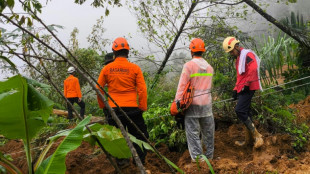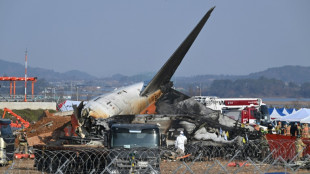

Russians take Epiphany dip in waters hit by oil spill
Russians in the southern city of Anapa took their traditional Epiphany dips in waters affected by a major oil spill, officials said, despite concerns about the toxic pollution.
Orthodox Christians celebrate Epiphany on the night of 18-19 January, with Russians across the country typically plunging themselves into icy seas, lakes and rivers to mark the occasion.
Officials in the southern city of Anapa said the festivities went ahead on the city's beach, despite the entire area having been contaminated by an ongoing major oil spill.
Heavy fuel oil has been washing up on hundreds of kilometres of beaches along Russia's southern coast and on the annexed peninsula of Crimea since two ageing Russian tankers were caught in a storm in the Kerch strait on December 15.
The regional task force overseeing the clean-up operation posted videos on social media of believers wading into the sea off Anapa in the pitch black to take the Epiphany dip.
"The water is very clear, I even dived underneath. Look, my hair is wet, and you can see there is nothing there. The water is pure, even the temperature is comfortable," an Anapa resident, Vladimir Balukov, said in the video, published on Saturday night.
The ceremony was overseen by a priest, while lifeguards accompanied those who went into the sea.
Officials said the water had been checked in advance.
But hours later the task force said an overnight storm had "brought new fragments of fuel oil to the coastline of Anapa."
Russian President Vladimir Putin has called the spill one of the "most serious environmental challenges" Russia has faced in recent years. Hundreds of birds and dozens of marine animals have died.
Russia said earlier in January that some 2,400 tonnes of the heavy fuel oil, known as mazut, had been spilt by the two tankers, which were loaded with 9,200 tonnes between them.
One of the stricken ships has since sprung a new leak, pouring yet more fuel into the sea.
The oil is particularly difficult to clean-up as it does not float on the surface.
Over the past month, thousands of volunteers have been scooping up oil deposits on beaches, with more than 168,000 tonnes of contaminated soil and sand collected, Russia's emergency situations ministry said Sunday.
Around 150 volunteers have sought medical treatment, including three who were hospitalised, the regional health ministry has said, without providing further details.
潘-H.Pān--THT-士蔑報




